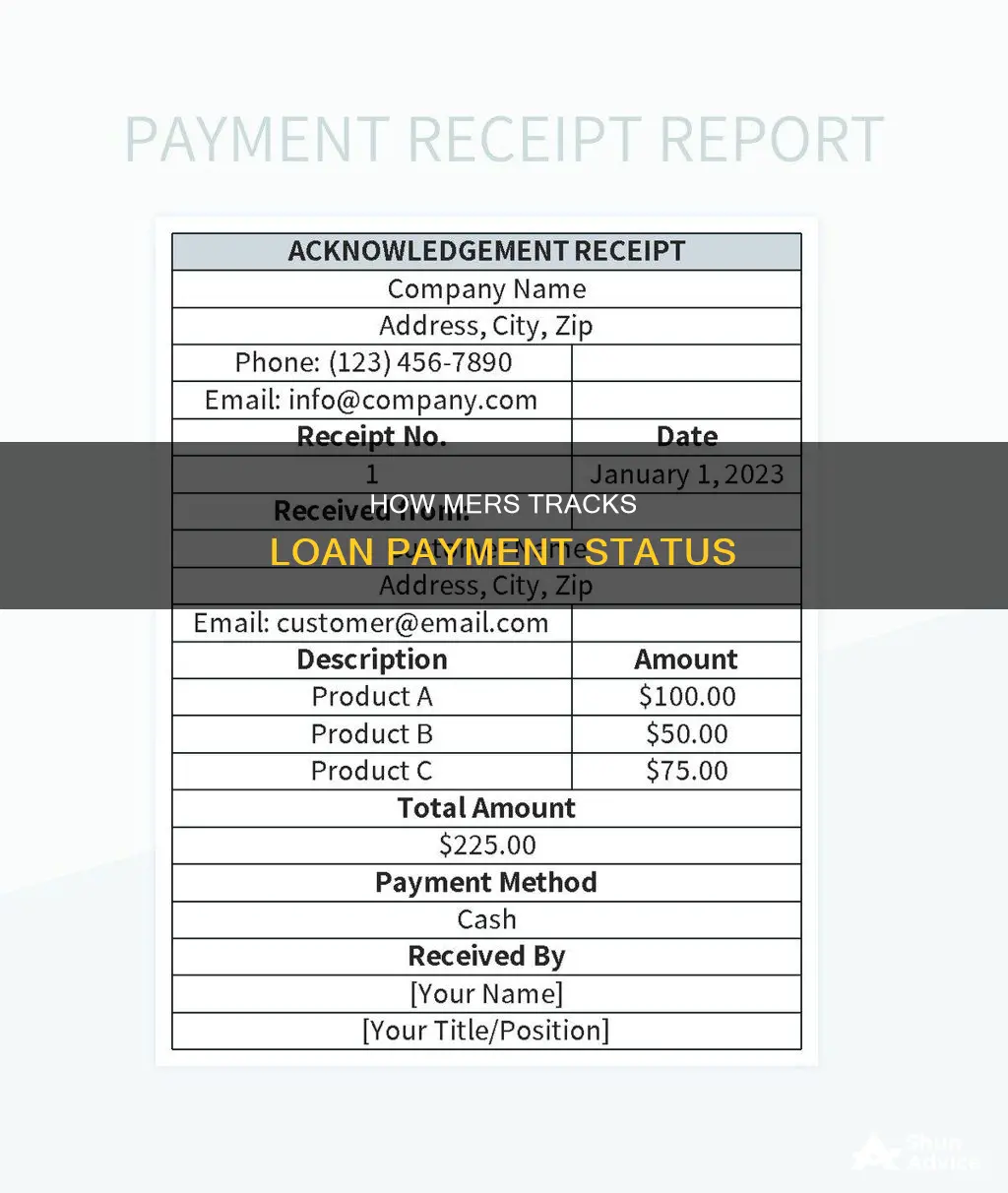
The Mortgage Electronic Registration System (MERS) is a privately-owned database that tracks mortgage loans, servicing rights, and ownership of loans. It was created by the mortgage banking industry to simplify the registration and transfer of mortgages. When a mortgage is sold from one bank to another, an assignment is typically prepared and recorded in the county land records. MERS eliminates the need for this long-standing practice by tracking loan transfers electronically. Each loan in the MERS system is assigned a unique Mortgage Identification Number (MIN) which remains the same throughout the loan's life, making it easier to track. While MERS may be listed as the mortgagee or loan owner, it does not collect monthly payments, own the debt, or service any loans. Instead, it acts as a nominee for the loan owner and can facilitate the transfer of loans between lenders.
| Characteristics | Values |
|---|---|
| Full Form | Mortgage Electronic Registration System |
| Type of Entity | Privately held company |
| Purpose | To simplify the registration and transfer of mortgages |
| Function | Tracks mortgages for its members as they are transferred from bank to bank |
| Registration Fee | A small fee may be charged |
| Role | Acts as a mortgagee, solely as a nominee for the lender |
| Tracking | Provides transparency throughout the life of the loan |
| Impact on Homeowners | Minimal impact, but can be useful to learn who holds the loan |
| Criticism | Difficult to ascertain the current owner of the mortgage |
| Foreclosure | Can initiate foreclosure, but cannot be a party to start it |
What You'll Learn

MERS is a private electronic database that tracks mortgages
The Mortgage Electronic Registration System (MERS) is a privately owned national electronic database created and used by the US mortgage banking industry to simplify the registration and transfer of mortgages. MERS was created to streamline the process of mortgage transfer from one bank to another, eliminating the need for the loan owner to record an assignment with the county recorder every time a loan is sold from one entity to another.
MERS is a good place for a homeowner to start if they need to find out who holds their mortgage. It is also used by many players in the real estate industry, including local governments, free servicers, lenders, municipalities, and insurers. MERS provides free public access to information about home mortgages.
When a mortgage is sold from one bank to another, an "assignment" (a document showing that the loan has been transferred) is typically prepared and recorded in the county land records. The assignment transfers the original lender's interest under the mortgage to the new bank. MERS then tracks the loan transfers, acting as the nominee for each holder, eliminating the need for separate assignments when the loan is transferred.
MERS is sometimes designated as the mortgagee, as the original lender is officially called in the mortgage documents. Such a loan is known as an original mortgagee (MOM) loan. While MERS then acts as mortgagee, it does so solely as a nominee for the loan owner and does not actually own the debt or hold the promissory note. In the case that a MOM loan goes into foreclosure, MERS would usually assign the loan back to the current owner.
Loans and Wages: Understanding FAFSA's Impact on Your Finances
You may want to see also

MERS simplifies the mortgage process by acting as a mortgagee
The Mortgage Electronic Registration System (MERS) is a privately owned database created by the mortgage banking industry to simplify the registration and transfer of mortgages. MERS acts as a mortgagee in county land records, but it doesn't actually own the mortgage loan. It is a one-stop site for mortgage documents, such as deeds of trust and promissory notes, and it greatly simplifies the mortgage process.
MERS maintains a national electronic database that tracks changes in mortgage servicing rights and beneficial ownership interests in loans. This database is operated by MERSCORP Holdings, a parent company of MERS, Inc. (a wholly-owned subsidiary). When a mortgage is sold from one bank to another, an "assignment" is typically prepared and recorded in the county land records. This assignment transfers the original lender's interest in the mortgage to the new bank. MERS simplifies this process by tracking mortgages for its members as they are transferred from bank to bank.
By tracking loan transfers electronically, MERS eliminates the need for the loan owner to record an assignment with the county recorder every time the loan is sold from one entity to another. This saves time and recording costs because multiple assignments aren't necessary each time the loan changes hands. MERS also provides transparency throughout the life of the loan. Lenders can assign loans to MERS if the loan has already been closed in the lender's name, and then tracking servicing and beneficial rights can occur electronically for all future transfers.
MERS is a good place for homeowners to start if they need to find out who holds their mortgage. It is also used by many players in the real estate industry for various reasons, such as finding undisclosed liens or establishing those responsible for maintaining vacant properties. MERS is also useful for lenders as it helps facilitate the process of transferring loans and reduces the costs of consecutive assignment filings.
Loan Star Title Loans: Buyout Options and Opportunities
You may want to see also

MERS does not own the debt or service any loans
The Mortgage Electronic Registration System (MERS) is a private electronic database that tracks new mortgage loans, servicing rights, and ownership of loans. It is a wholly-owned subsidiary of MERSCORP Holdings, Inc. and acts as a nominee for lenders and their successors and assigns.
MERS simplifies the process of transferring mortgage loans from one bank to another by eliminating the need to record an assignment with the county recorder every time a loan is sold. Instead, lenders can record the security instrument in public land records and register the loan on the MERS system, which tracks changes in mortgage servicing rights and beneficial ownership interests in loans.
While MERS may be listed as the mortgagee or beneficiary in the security instrument, it does not own the debt or hold the promissory note. In other words, MERS does not collect monthly payments and does not service any loans. It is only listed as a mortgagee for convenience, so it can act on behalf of the loan holder and eliminate the need for separate assignments each time the loan is transferred.
In some states, MERS cannot be a plaintiff in a judicial foreclosure because it does not have a direct interest in the lawsuit's outcome. However, in non-judicial foreclosure states, MERS may be listed as the beneficiary in foreclosure notices, acting solely as a nominee for the loan owner.
Loan Regulations: State-by-State Differences in the USA
You may want to see also

MERS can be listed as a beneficiary in nonjudicial foreclosure notices
The Mortgage Electronic Registration System (MERS) is an American private electronic database created by the banking industry to track new mortgage loans, servicing rights, and ownership of the loans. It is a national database that operates by tracking changes in mortgage servicing rights and beneficial ownership interests in loans.
MERS simplifies the process of transferring loans from one bank to another by eliminating the need for the loan owner to record an assignment with the county recorder every time the loan is sold from one entity to another. It also helps lenders by reducing the costs of consecutive assignment filings.
In some cases, MERS is designated as the beneficiary in the deed of trust, acting as the lender's nominee. In other cases, the loan might be assigned to MERS (solely as a nominee) sometime later in its life cycle after the loan closes.
In 2011, MERS changed its rules so that, in most cases, foreclosures may no longer be started in its name. Before the foreclosure starts, MERS usually assigns the loan back to the lender or the current loan owner. In a nonjudicial foreclosure, the lender or current owner of the loan is named as the beneficiary in the foreclosure notices.
M&T Investment Loans: What You Need to Know
You may want to see also

MERS is not responsible for keeping mortgage records
The Mortgage Electronic Registration System (MERS) is a company created by the banking industry to simplify the process of transferring mortgages from one bank to another. It is a national electronic database that tracks changes in mortgage servicing rights and ownership interests in loans secured by residential real estate.
MERS is not involved in the monthly payments of a loan and does not service any loans. Its sole purpose is to serve as a mortgagee in the land records for loans registered on its system. MERS provides free public access to information about home mortgages, which can be useful for homeowners, local governments, free servicers, lenders, municipalities, and insurers, among others.
While MERS can be a good place for a homeowner to start if they need to find out who holds their mortgage, it is important to note that MERS itself does not keep mortgage records. The records are maintained by the loan owner or servicer, who is responsible for recording any changes or transfers of the mortgage in the public land records.
Second Chance Installment Loans: A Realistic Option?
You may want to see also
Frequently asked questions
MERS stands for Mortgage Electronic Registration System. It is an American private electronic database created to track new mortgage loans, servicing rights, and ownership of the loans.
MERS does not collect monthly payments and does not own the debt or service any loans. MERS is generally only listed as a mortgagee for convenience and to act on behalf of the loan holder.
MERS is a good place to start to find out who holds your mortgage. You can access the registry to find information about your mortgage service provider for free.
MOM stands for "MERS as Original Mortgagee". In some home loan transactions, the mortgage designates MERS as the mortgagee, solely as a nominee for the lender.







